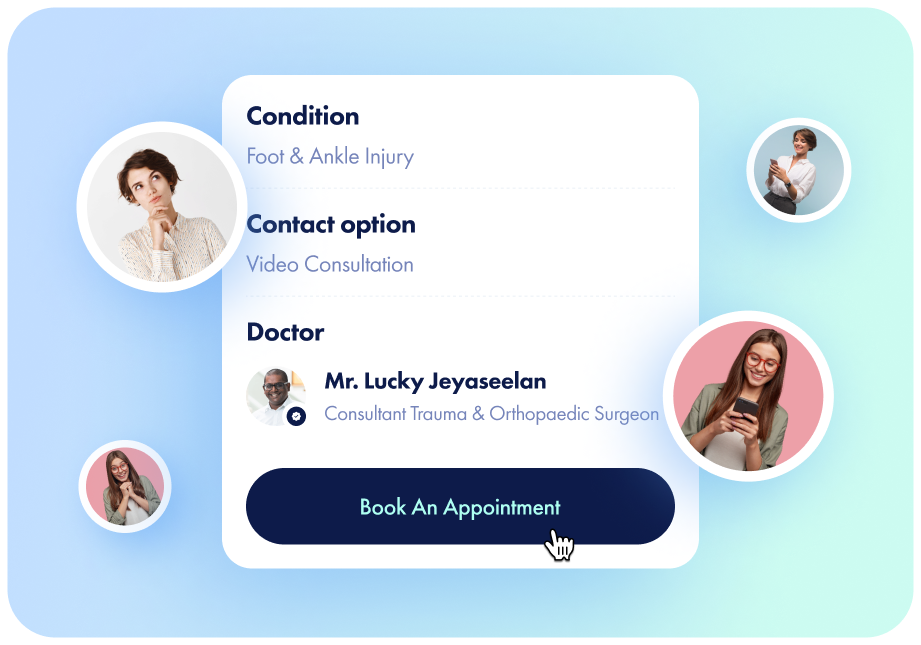
Conveniently reserve your spot with just a few clicks through our easy-to-use online booking system.

Basal cell carcinoma (BCC) is the most common type of skin cancer, affecting millions of people worldwide. It typically develops on areas of exposed skin, like the face, neck, and shoulders. BCC grows slowly and rarely spreads to other parts of the body. However, early detection and treatment are crucial to prevent complications and ensure optimal cosmetic outcomes. Fortunately, BCC is highly treatable with various effective options available.
You are not required to provide a referral letter from your doctor or GP.
Start a visit quickly and discreetly whenever works best for you.
Our doctors review symptoms, prescribe treatments if needed.
Proceed with your healthcare journey as you wish. You're in control.
You control medical records, access anytime.
Getting diagnosed with basal cell carcinoma starts with a look at your skin. Our specialists will check for any unusual growths and might ask you about your sun habits, sunscreen usage, and whether you've used tanning beds.
If there's a spot on your skin that looks suspicious, the next step is to get a closer look by taking a small piece of it. This is called a biopsy.
Here's what happens during the procedure:
First, they'll numb your skin so you won't feel anything during the biopsy.
The doctor will remove a tiny piece of the skin growth.
That sample gets sent off to a lab where experts will check it under a microscope to see if there are any cancer cells.
A biopsy helps doctors determine if a spot is basal cell carcinoma. It's a quick procedure, and it's the best way to get an accurate diagnosis. If you're worried about a spot on your skin, don't wait—talk to one of our team and get it checked out.
Сontact us to schedule an appointment or learn more
Conveniently reserve your spot with just a few clicks through our easy-to-use online booking system.
Have a question or request? Drop us a message, and our team will get back to you promptly.
Feel free to give us a call, and our friendly staff will be glad to assist you over the phone.
Your doctor will evaluate several factors to decide on the best treatment approach for you. This includes the cancer's size, location, how long it's been there, potential scarring, and your general health.
Here's an overview of treatments your doctor might talk to you about:
This means cutting out the cancer. The skin is numbed, the tumour is scraped away with a curette (a spoon-like instrument), and then the tumour and a bit of normal-looking skin around it are removed and sent to the lab for examination.
After numbing, the tumour is scraped away. An electric needle stops bleeding and zaps any remaining cancer cells.
The cancer cells get frozen off with liquid nitrogen.
High-energy X-rays are used over several visits to kill the cancer cells.
There are special creams and medications for basal cell carcinoma that you use for a few weeks under your doctor's guidance.
Named after its developer, this method involves removing the cancer layer by layer. Each layer is examined under a microscope until no more cancer cells are found.
Your doctor might lean towards Mohs surgery, especially if the tumour is:
Other options might include photodynamic therapy that uses light to destroy cancer cells after treating the skin with a light-sensitive drug. Each treatment has its place, and your doctor will help guide you to the right one for you.
From Home or Face to Face, all at your convenience
Schedule a Video Consultation or a Face-to-Face appointment at your convenience by using our online booking system.
Speak with a Specialist
Schedule a Video Consultation or a Face-to-Face appointment at your convenience by using our online booking system.
Get a Personalised Treatment Plan
Your dedicated Specialist Doctor will provide you with personalized treatment, tailoring it to your specific needs, and may include necessary medication.
While it's true that basal cell carcinoma typically stays local and doesn't usually spread, it's not without its possible hiccups. Knowing the potential complications is vital. Here's what to keep an eye out for
When caught early, treatment tends to be very effective. So it's important to stay alert and check in with your doctor regularly.
While it's true that basal cell carcinoma typically stays local and doesn't usually spread, it's not without its possible hiccups. Knowing the potential complications is vital. Here's what to keep an eye out for
When caught early, treatment tends to be very effective. So it's important to stay alert and check in with your doctor regularly.
Recurrence:
This cancer can be a bit stubborn. Even after you've had it treated, there's a chance it can come back.
Other Skin Cancers:
Once you've had basal cell carcinoma, your chances of developing another skin cancer, like squamous cell carcinoma, go up.
Spread of Cancer:
It's quite rare, but there's a small possibility for the cancer to move to other parts of your body, affecting lymph nodes, bones, or even lungs.
Successfully treating basal cell carcinoma isn't the end of the road. It's important to remain attentive to reduce the risk of recurrence. This means adopting a routine of thoroughly examining your skin for any new or changing spots.
Sunshine can be deceiving, especially between 10 a.m. and 2 p.m. when UVB rays peak. Schedule outdoor activities outside these hours to minimise sun exposure. Even when the sun doesn't feel strong, its UVA rays are always around. Make sunscreen a daily habit, applying it every morning and reapplying as needed throughout the day, no matter the weather or your plans.
Lastly, your wardrobe can play a protective role. A broad-brimmed hat shields your face, and clothing that covers your arms and legs acts as a barrier against the sun.
Successfully treating basal cell carcinoma isn't the end of the road. It's important to remain attentive to reduce the risk of recurrence. This means adopting a routine of thoroughly examining your skin for any new or changing spots.
Sunshine can be deceiving, especially between 10 a.m. and 2 p.m. when UVB rays peak. Schedule outdoor activities outside these hours to minimise sun exposure. Even when the sun doesn't feel strong, its UVA rays are always around. Make sunscreen a daily habit, applying it every morning and reapplying as needed throughout the day, no matter the weather or your plans.
Lastly, your wardrobe can play a protective role. A broad-brimmed hat shields your face, and clothing that covers your arms and legs acts as a barrier against the sun.
Have you spotted any changes in your skin recently? Maybe an odd bump or a patch that's just not healing right? Don't wait. Reach out and schedule a consultation at our London-based clinic.
Our team of dedicated skin specialists is here to guide you with care and expertise, ensuring your skin remains healthy and you stay informed every step of the way.


















